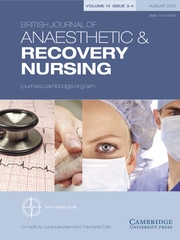Personal details
Marianne Riesen, born 1946, retired May 2012, Nationality: Swiss, divorced, one son (41) lawyer
Employment – experience
January 2008–May 2012
Limmattal Hospital, Department of Anaesthesia, Schlieren, Switzerland (www.spital-limmattal.ch). The hospital is practice station for anaesthesia-, intensive care- and A & E (Accident and Emergency) nursing education. The school is in Zürich (www.oda-g-zh.ch) where I used to teach the subject of inquiry-based learning and evidence-based practice. At Limmattal Hospital, I was responsible for the 2-year post-diploma education of Nurse Anaesthetists as well as for the continuous professional development (CPD) scheme of the qualified Nurse Anaesthetists. This took up about 40% of my working time. During the remaining 60% I worked in the theatre as a nurse anaesthetist. It was always my belief that a nurse educator has to keep practice up to the latest standard and in my experience it contributed a great deal to enjoying credibility with the students.
You may well wonder how I came to be a peer at your journal. There is the story: I am a member of the education committee of the International Federation of Nurse Anaesthetists (IFNA) since 1999. That is when I got to know Pat Smedley who was the representative for British Anaesthetic and Recovery Nurses Association (BARNA). In 2003, she pointed me to a project, called New Ways of Working in Anaesthesia. People running it were looking for practitioners from abroad in order to find out how to work with such people in English Anaesthesia departments. I found this very fascinating and hence applied and was accepted at Wansbeck General Hospital in Ashington, Northumberland where I worked all of 2004 and 2005. I was then offered a post at Hinchingbrooke Hospital, Huntingdon East Anglia, UK, where I stayed all of 2006 and 2007. While in the UK, I joined the BARNA conference in Hove in 2004 to give a presentation on Nurse Anaesthesia in Switzerland. So you see, my contacts to BARNA go back some years.
Before coming to England, I directed the post-diploma study course of Nurse Anaesthesia at the cantonal Hospital of St. Gallen for some years (www.kssg.ch). This is a very big teaching hospital in Eastern Switzerland and we had many students. Before becoming a director I was a teacher at the program for 7 years. I earned my Nurse Anaesthesia qualification in 1983 and practiced for 11 years before doing a diploma as Nurse Educator.
I came to Anaesthesia from Intensive Therapy Unit (ITU), which is also a 2-year post-diploma course in Switzerland. I earned this qualification in 1977 and stayed in ITU until 1981. That makes for a very long experience in the world of acute and critical care nursing.
Education
Nursing Education, Diploma: 1968
Post-diploma qualification in intensive care: 1977
Post-diploma qualification in nurse anaesthesia: 1983
Diploma as Nurse Educator: 1995
University education
Bachelor of Nursing: Transition Program, awarded 2000 from Christchurch Polytechnic, Christchurch New Zealand.
Master Nursing science: 2003 Research modules only (theory building and research methods) University of Wales, Cardiff, UK.
Memberships
Swiss Federation of Nurse anaesthetists (SIGA): For SIGA, I am leading a committee that is in the process of introducing a CPD scheme.
The goal will be to regularly acknowledge CPD of the Swiss Nurse Anaesthetists. I was a member of the SIGA Journal's editorial board until December 2011 and still hold an advisory role.
IFNA: For IFNA, I am serving on the Education Committee since 2000. Some years ago, the committee started an international recognition process of Nurse Anaesthesia schools. To include many different schools in different nations the scheme has three categories (registration, recognition and accreditation). In November 2011, IFNA carried out its very first accreditation. Together with my Swedish colleague Karin Björkman Björkelund, I accredited the school for Nurse anaesthesia at the Hospital Pitié Salpétrière in Paris. The accreditation will be announced at the 10th IFNA World Conference in Ljubliana end of May 2012.


